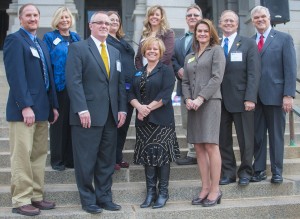In this Capitol Report:
This Capitol Report is brought to you by:
State Policy News
Rally Highlights CACI’s “Chamber Day at the Capitol”

Pictured, from left to right: Jack Llewellyn, Durango Chamber; Diane Schwenke, Grand Junction Area Chamber; Dennis Houston, Parker Chamber; Kami Collins- Delta Area Chamber of Commerce; Andrea La Rew- Chamber of Commerce of Highlands Ranch; Jennifer Kerr, Broomfield Chamber; Frank Ladd, Rifle Chamber; Kim Arnold, Colorado’s Women’s Chamber; Kevin Hougen, Aurora Chamber; Chuck Berry, CACI
Yesterday, shortly before 12 Noon, a rally on the West Steps of the State Capitol capped the inaugural CACI “Chamber Day at the Capitol” to highlight the role of state public policy in creating a healthy business climate. The purpose of “Chamber Day at the Capitol” was to focus the attention of state legislators on important business issues facing the Colorado General Assembly this session.
CACI President Chuck Berry addressed the rally, and he was joined by a number of local chamber presidents. Following is an edited version of Chuck’s prepared remarks:
Welcome to the Colorado Association of Commerce & Industry’s Chamber Day at the Capitol. As many of you know, CACI is the state chamber of commerce and the state manufacturers association and our advocacy interests are statewide. Our mission is to champion a healthy business climate, and to that end, CACI is supported by over 40 local chambers of commerce – the leaders of many are here with us today.
Private-sector jobs and the promise of the ability to succeed is our focus as the state chamber and the focus of Colorado’s many and important local chambers of commerce.
We believe that Colorado’s laws should support private sector job creation, and when it is necessary to regulate, should do so with the lightest touch possible to encourage our path forward. We gather here today, together, to remind legislators to strive for a positive business climate – that enables Colorado’s citizens to achieve the lives they wish to achieve.
Mark Moses of Outback Steakhouses in Colorado has explained that a majority of their store partners started as hourly employees, hosts, servers, and cooks. As profits enable new stores to be built, new hardworking leaders continue to earn advancement, becoming Managers and Operating Partners.
That’s a great example of why, when Colorado policymakers consider laws and regulations that impact business, they should strive to keep business costs low – to create opportunities for Coloradans to succeed. When legislators and policymakers raise business costs, businesses do not expand and these opportunities are lost.
Whether in hospitality, manufacturing, professional services, or any other private sector industry, Colorado’s laws and regulations should support responsible job growth. So today, the leaders of over a dozen Local Chambers of Commerce from across the state, joined by many CACI members, are here to learn more about what goes on in this building and to remind the legislators who work here to make decisions that improve the business climate and encourage business growth.
The following four chamber presidents then addressed the rally:
- Kevin Hougen, Aurora Chamber of Commerce;
- Diane Schwenke, Grand Junction Chamber of Commerce;
- Jack Llewellyn, Durango Chamber of Commerce; and
- Jennifer Kerr, Broomfield Chamber of Commerce.
The four chamber presidents covered a wide range of business issues, including proposed restrictions on energy production, help for small businesses to bid for governmental contracts, concern over the closing of military bases in Colorado because of Federal defense cutbacks, encouragement of the aerospace industry, disparities across the state in terms of economic recovery, road and highway maintenance, tourism promotion, the importance of small businesses to the state’s economy, the local business personal property tax, the state’s complicated sales-and-use tax system, health-care costs and the complexity of the Federal Affordable Care Act and its implementation and rural access to high-speed Internet/broadband.
The rally followed a morning session at the Capitol for local chamber members and participants in the CACI EXECs Advocacy Program.
Loren Furman, CACI Senior Vice President, State and Federal, provided an overview on how to effectively contact legislators and testify at a committee hearing. Loren was joined by fellow business lobbyists Gayle Berry and Joan Green Turner, both of whom are former state legislators. Other speakers included:
- Virginia Morrison Love, a contract lobbyist for Pinnacol Assurance, who discussed workers’compensation issues;
- Joe Rice, Director of Government Affairs for CACI Silver Partners Lockheed Martin Space Systems Company, who discussed bills and policies that affect the aerospace industry; and
- Tisha Schuller, president of the Colorado Oil and Gas Association, who discussed issues and legislation affecting the oil-and-gas industry.
Business Personal Property Tax Relief Bill Clears First House Committee Hurdle
The House Business, Labor, Economic and Workforce Development Committee yesterday unanimously approved HB-1279, which sends the bill to the Finance Committee.
Here’s the fiscal note’s summary of the bill:
Beginning January 1, 2014, for the next five income tax years, this bill creates a state income tax credit for businesses for the amount of business personal property tax paid in Colorado. The credit is equal to the amount of business personal property tax paid, less the value of the tax benefit received by the taxpayer from deducting these taxes from his or her federal taxable income. This is accomplished by multiplying the amount of business personal property tax paid times 100 percent minus the taxpayer’s federal marginal income tax rate minus the state’s income tax rate of 4.63 percent.
The credit is available in tax year 2014 only to businesses with $25,000 or less of personal property, but this threshold is adjusted annually for inflation thereafter. The tax credit is refundable, meaning that any portion of the credit exceeding a taxpayer’s income tax liability must be refunded to the taxpayer. To claim the credit, the taxpayer must submit a copy of his relevant property tax statement for his business personal property to the Department of Revenue (DOR).
The lead House sponsors of the bill are Democratic Representatives Dave Young and Diane Primavera.
Loren Furman, CACI Senior Vice President, State and Federal Relations, testified in support of the bill., noting that CACI has “for decades” been advocating legislation that would lessen the burden of the personal property tax on businesses.
For more information on HB-1279, read:
“Business personal property tax break bill coming—but in smaller form,” by Ed Sealover, The Denver Business Journal, February 4th.
Energy & Environment Council Takes Positions on Bills
The Energy & Environment Council met this week to review issues and legislation, taking positions on several bills. The Council will oppose HB-1297 Analyze Health Data of Front Range Oil and Gas by Rep. Ginal and Sen. Aguilar. The bill directs the Department of Public Health & Environment (CDPHE) to conduct an analysis of human health and quality of life within front range counties, with the intent of drawing conclusions related to oil and gas activities.
CACI has a number of concerns about the bill, starting with what seems to be a predetermined outcome that any human health or quality of life findings would be attributed to a specific industry. Additionally, the voting members of a “Scientific Oversight Committee” created by the legislation would be entirely comprised of political appointees, raising questions of whether this is meant to be a scientific endeavor or a political one. CACI’s Energy & Environment Council supports scientifically sound research to ensure safety in our state, but HB-1297 fails to meet that bar.
The Council also voted to support CDPHE efforts to restore three cash funds that were raided during the last economic downturn. CDPHE has requested that the Joint Budget Committee pay back the Recycling Resources Economic Opportunity Fund, the Hazardous Substances Response Fund, and the Waste Tire Cleanup Fund. The regulated community, including many CACI members, paid the fees that built of the balances in these funds, and which will need to be built back up one way or another. For example, the Hazardous Substances Response Fund covers the State’s 10% match for federal dollar for environmental cleanup, and there are significant environmental implications for not receiving those federal funds. Colorado needs to honor the commitments made by the collection of fees for these efforts, and CACI will be advocating for such.
Businesses Oppose HB-1108 as it Heads to the Senate Floor
HB-1108, an insurance mandate that will increase costs, will be heard on the Senate floor on Monday, and CACI, as well as other business organizations and many member companies, has rallied in opposition to the legislation. HB-1108 by Rep. Primavera and Sen. Tochtrop is an insurance mandate that prohibits the copay or cost-sharing for physical/occupational therapy, massage therapy, acupuncture, or chiropractic from being greater than the cost-sharing for primary care.
Colorado has intentionally aimed to set the copays and other cost-sharing mechanisms for primary care lower than all other services, in order to make it easier for people to visit their primary care doctor (and not the emergency room for non-emergency needs) when they need care and establish a medical home. By mandating that the cost-sharing for these select services be lower than what is currently charged in most insurance plans, this legislation will drive an increase in the cost of premiums. When looking at the cost of any given health care service, if you lower the amount of the copay a patient pays, the insurer must make up the difference to pay for the total cost of the service, which drives higher premiums to make up the difference. This directly impacts Colorado businesses, which will see the higher cost of insurance passed along to them and their employees.
Additionally, the members of the Senate committee that heard the bill earlier this week recognized the increased cost concerns that CACI and others expressed, and opted to address those by amending the bill to say that an insurer could not raise premiums as a result of the copayment limitations in the bill. For businesses, this is even more problematic – state law mandating that a private business cannot charge for the full cost of the service they provide.
The bill will be on the Senate floor on Monday, and CACI is working to build a coalition of businesses and local chambers opposed to the bill. For more information, or to add your name to the list of opponents, contact Carly West.
News Media Coverage
Below is recent news-media coverage of business, political, policy and governmental issues of interest to CACI:
“Colorado caucus system is about grass-roots politics,” editorial, The Denver Post, March 5th.
“Colorado small businesses won’t get a break on rules, and union blamed,” by Ed Sealover, The Denver Business Journal, March 5th.
“New Colorado business group aims to counter anti-fracking movement,” by Cathy Proctor, The Denver Business Journal, March 5th.
“Richard Florida pegs Denver as part of ‘urban revolution’,” by Dennis Huspeni, The Denver Business Journal, March 5th.
“AT&T names Roberta Robinette to key lobbying role as Colorado president,” by Andy Vuong, The Denver Post, March 4th.
“Denver among metro areas leading economic revolution,” by Aldo Svaldi, The Denver Post, March 4th.
“Bob Beauprez runs again for Colorado governor: ‘I still want it,’” by Lynn Bartels, The Denver Post, February 4th.
“Fracking, regulation and the future of oil and gas: The view from the Vail energy forum,” by Cathy Proctor, The Denver Business Journal, March 4th.
“Colorado tries to revive education overhaul,” by Kristen Wyatt, The Associated Press, The Denver Post, March 3rd.
“Colorado’s tough new air rules for oil and gas: Inside story of how industry, enviros joined forces,” by Cathy Proctor, The Denver Business Journal, March 3rd.
“Another business personal property tax bites the dust at Colorado legislature,” by Ed Sealover, The Denver Business Journal, March 3rd.
“From state logo to death penalty, GOP candidates aim at Hickenlooper,” by Lynn Bartels, The Denver Post, March 2nd.
“Colorado’s troubled ethics law,” editorial, The Denver Post, February 2nd.
“Candidates are key for Colorado GOP, sans convention,” opinion by Dick Wadhams, The Denver Post, February 28th.


